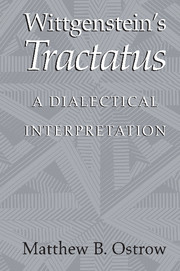Introduction
Published online by Cambridge University Press: 03 February 2010
Summary
Wittgenstein, in conversation with Moritz Schlick, once characterized his fundamental goal in philosophy as follows: “Everything we do consists in trying to find the liberating word (erloesende Wort)” (VC 77). Similarly, we find in The Big Typescript: “The philosopher strives to find the liberating word, that is, the word that finally permits us to grasp what up until now has intangibly weighed down our consciousness” (PO 165). Both remarks were made in the 1930s, years after the publication of the Tractatus: with their depiction of philosophy as the pathway out of psychic encumbrance, they quite naturally call to mind Wittgenstein's later, explicitly “therapeutic” thought (cf., e.g., PI 133). But, we might ask, could such claims be applied to Wittgenstein's early work as well? Would Wittgenstein have been willing to describe the Tractatus itself as an effort to find “the liberating word”? My fundamental contention in this book is that this is indeed the case, that, far from seeking to offer a new theory of logic, to continue the philosophical legacies of Frege and Russell, Wittgenstein from the start views all such endeavors as the ensnarement of thought. The Tractatus, I shall aim to show, is nothing but an attempt to set down in definitive fashion the way of release.
For those involved in writing and reflecting on early analytic philosophy, such an assertion is likely at once to locate this study in the grid of a familiar set of dichotomies.
- Type
- Chapter
- Information
- Wittgenstein's TractatusA Dialectical Interpretation, pp. 1 - 20Publisher: Cambridge University PressPrint publication year: 2001



